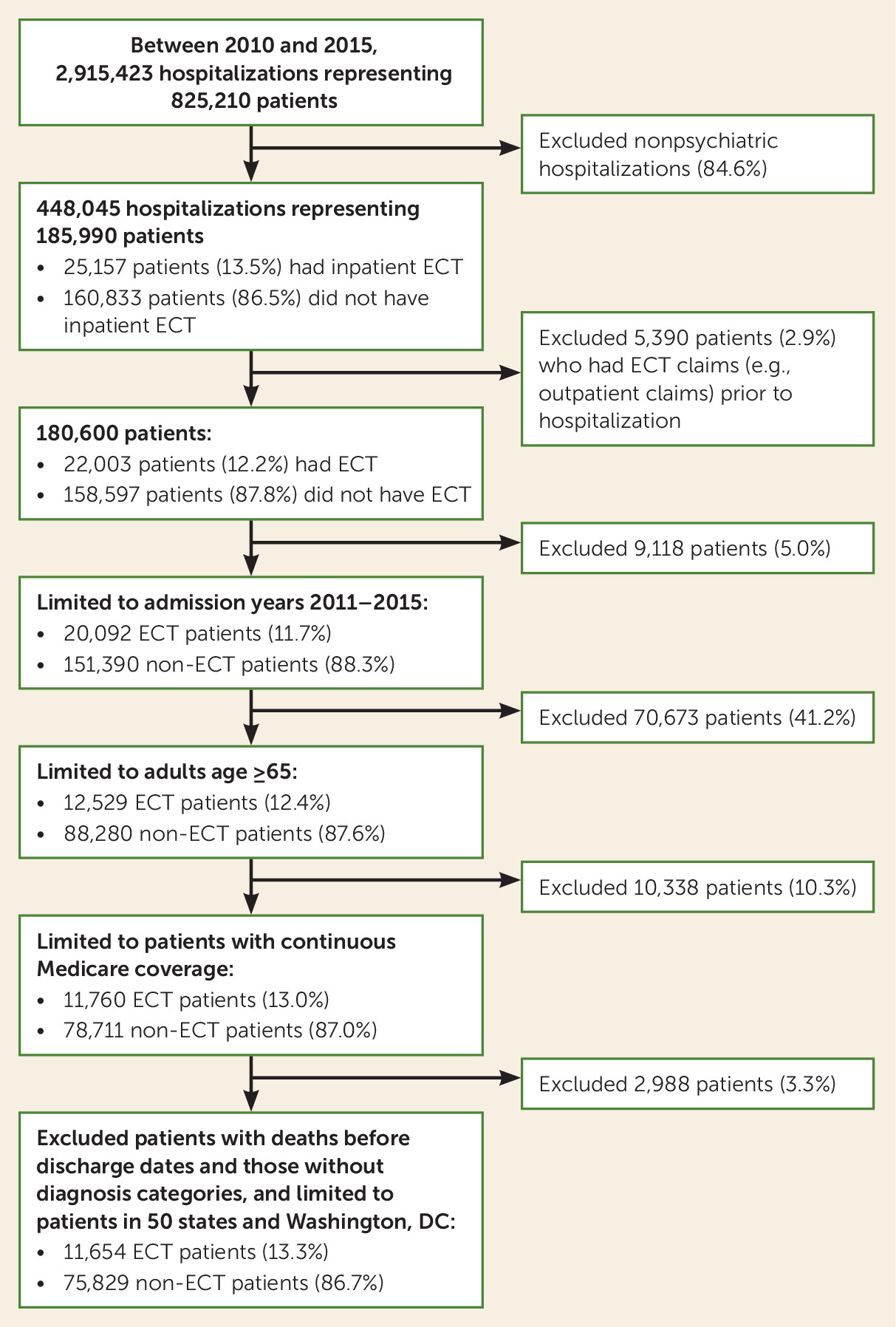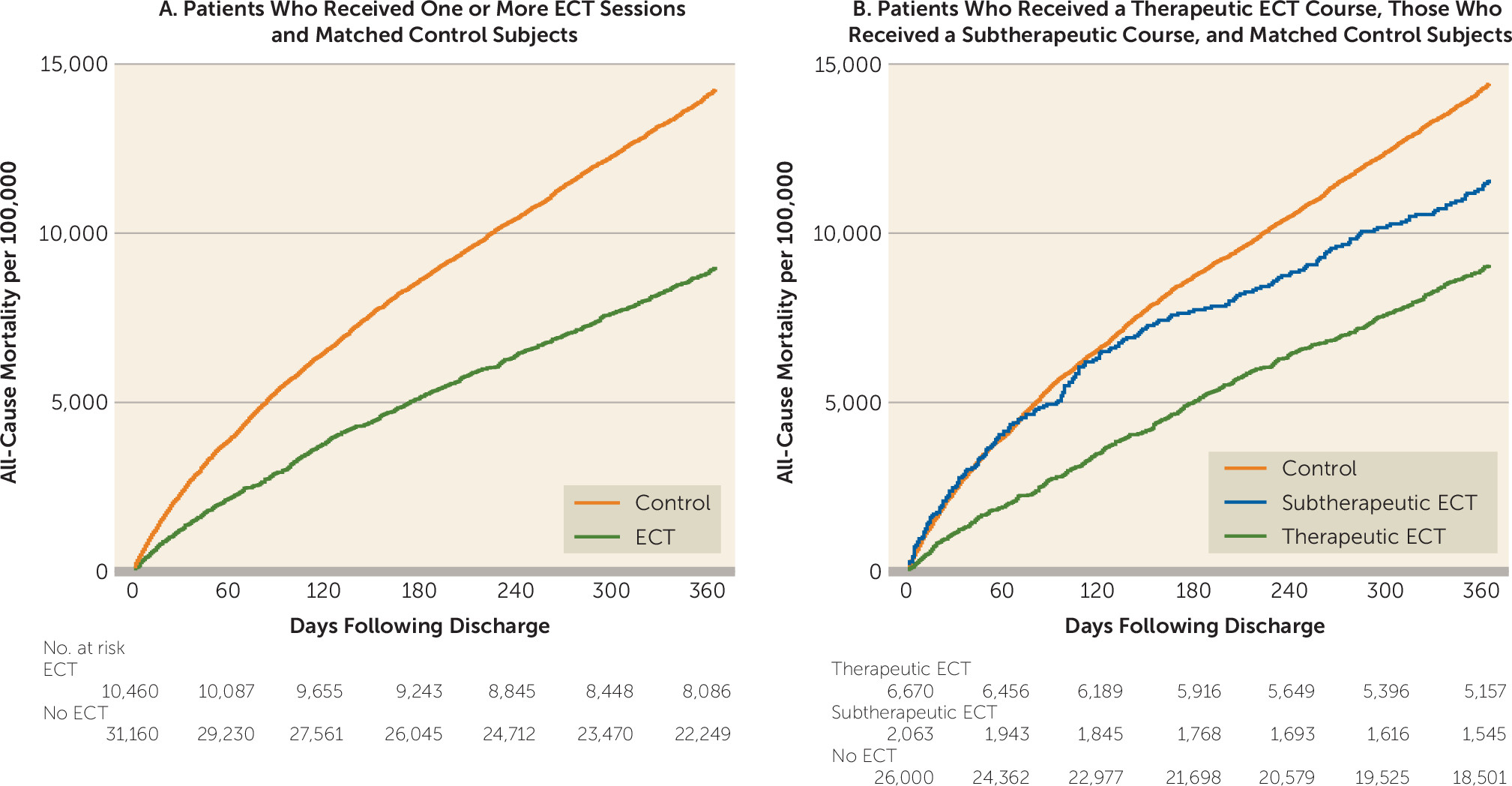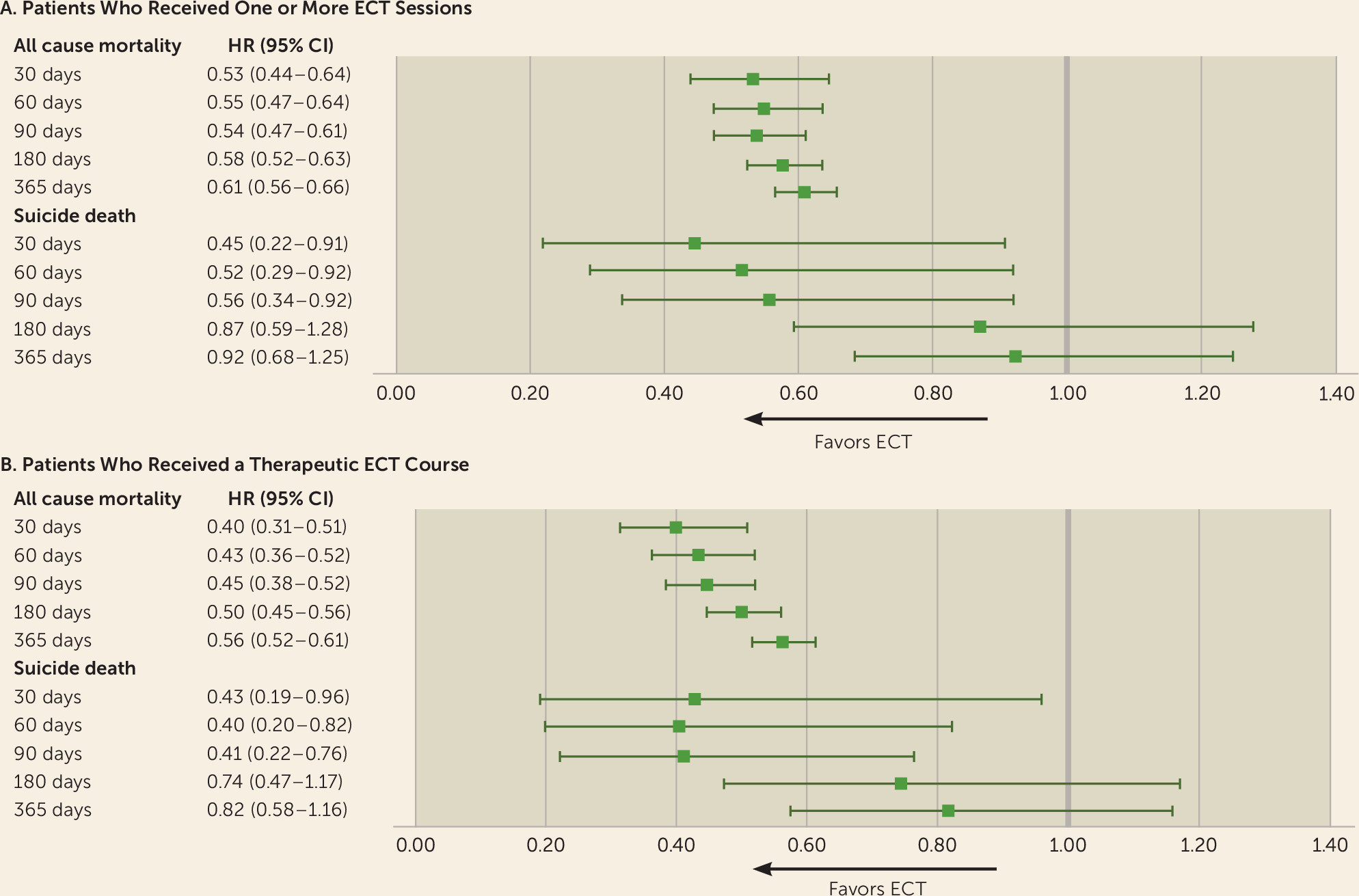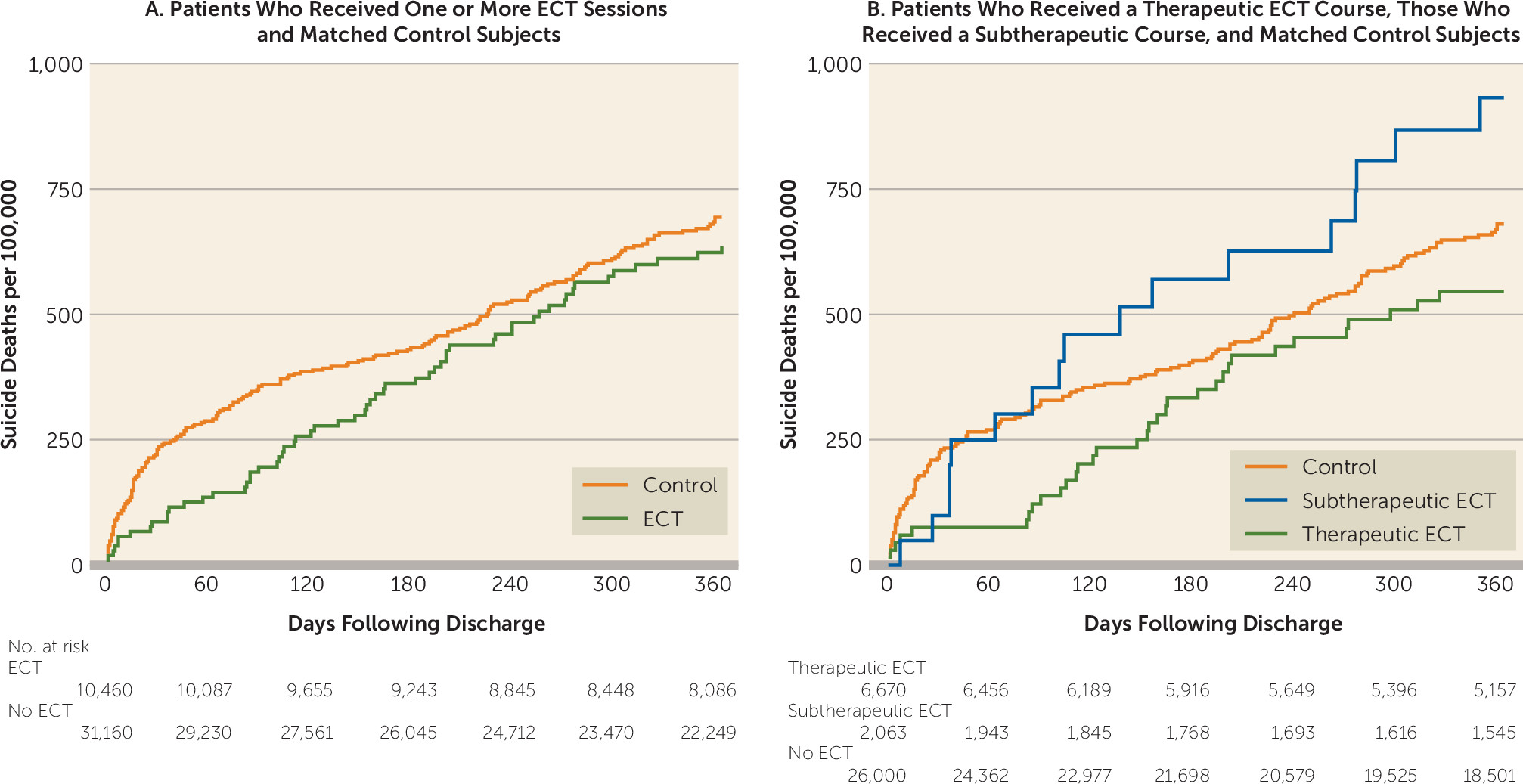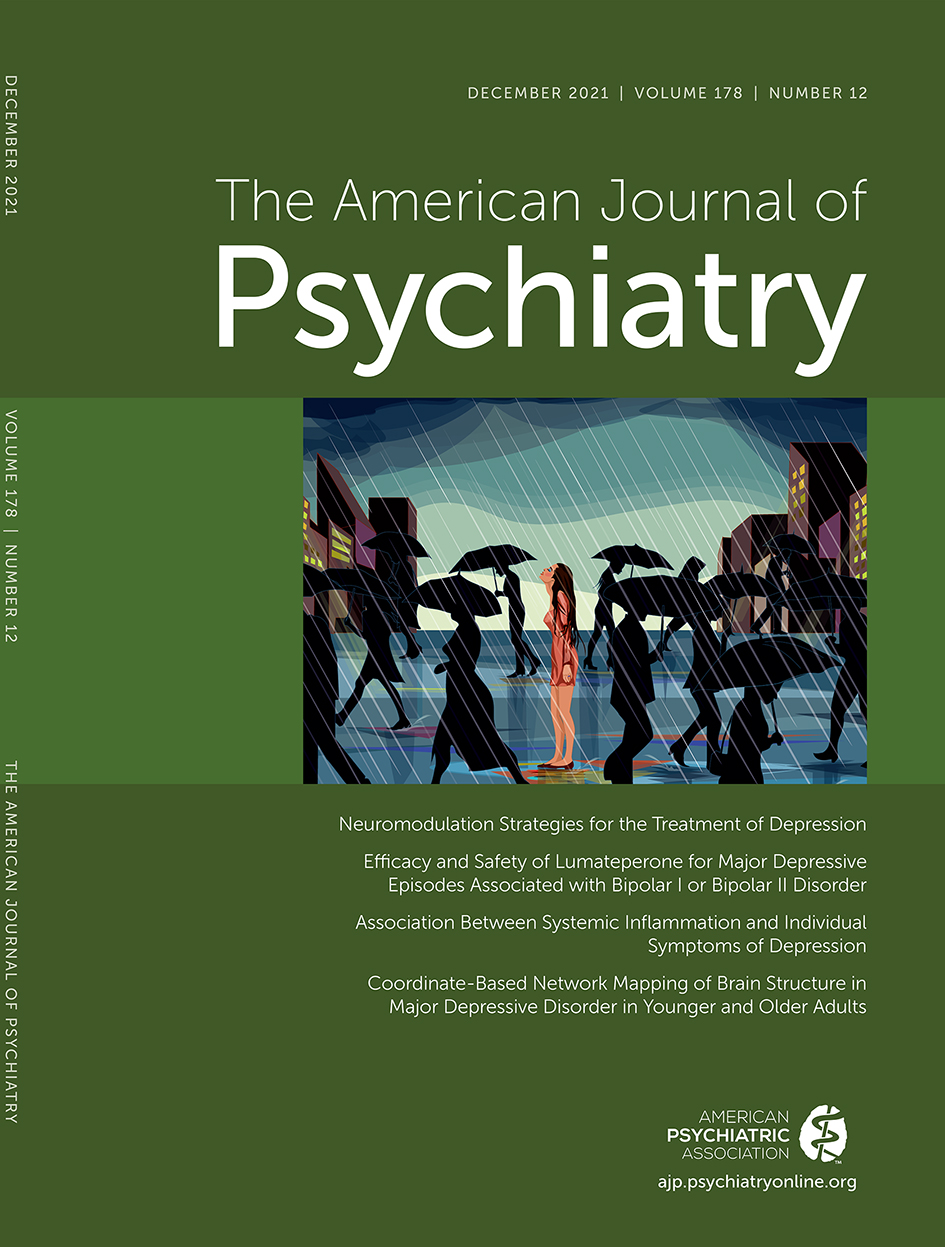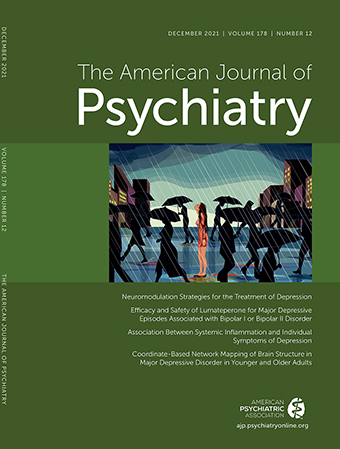Mood disorders, including major depressive disorder and bipolar disorder, are a leading cause of disability worldwide (
1). Individuals who suffer from mood disorders are at greater risk for premature mortality compared with the general population. For males, this translates to approximately 10 years of life expectancy lost for individuals with major depressive disorder or bipolar disorder; among females, 7–11 years of life expectancy are lost (
2). This increased risk of mortality has been reported across several causes of mortality, including suicide, cardiovascular disease, and cancer (
3–
5). The risk of premature mortality is also considerably higher among individuals with psychosis compared with the general population (
6).
With respect to suicide, the period immediately following psychiatric hospitalization is one of markedly elevated risk. In one report on Medicaid patients, suicide rates per 100,000 person-years were 235 for major depression, 216 for bipolar disorder, and 168 for schizophrenia in the 3 months following psychiatric hospitalization (
7). Studies in Europe have documented similar findings (
8). Inpatients who were not well connected to outpatient health care in the 6 months before admission are also at increased short-term suicide risk (
7), which suggests that at least part of the increased risk is mediated by the poor transition of care that occurs as patients shift from inpatient to outpatient care.
Some research suggests that ECT may reduce all-cause mortality. However, narrow target populations, small sample sizes, and concerns over confounder control cast some uncertainty over this work. The most recent study, which reported decreased mortality and suicide risk over an 8-year follow-up for adults with major depression or posttraumatic stress disorder (
9), was from a single Veterans Health Administration center and included 92 ECT patients and therefore may not generalize to broader practice. A larger study of 783 ECT patients in the United Kingdom also found lower mortality among those receiving ECT than among a comparison cohort; however, that study did not account for potentially confounding baseline clinical differences between cohorts (
10). In addition, an early cohort study of 135 ECT patients from a single state psychiatric hospital (
11) reported a reduced risk of all-cause mortality, but that study also did not control for baseline clinical differences between study cohorts. By contrast, an early study from upstate New York (
12) found higher mortality among depressed inpatients receiving ECT compared with those not receiving ECT. However, that study also did not account for potential confounding patient characteristics other than age.
Studies on the effects of ECT on suicide have been inconsistent. Early studies comparing suicide rates across eras (i.e., when ECT was the primary approach to treating psychiatric disorders in the 1940s compared with when ECT was not yet available in the 1930s) suggested an effect on suicide but were subject to methodological limitations such as cohort effects (
13,
14). Some later studies showed a long-term association of ECT with lower rates of suicide but were limited to a single site (
9) or were conducted in areas of the world where ECT is much more common and is used on less severely ill patients (
15). A recent large multisite cohort analysis of Veterans Health Administration hospitals showed no effect on suicide over a 1-year follow-up period (
16).
In the present study, we examined the association of ECT with important clinical outcomes—all-cause mortality and suicide—in a large, nationally representative cohort of Medicare patients. Given that ECT is particularly effective in older adults (
17,
18), we chose to focus our analyses on older patients.
METHODS
Data Source
The data for this study were obtained from the Medicare fee-for-service claims database (including Part D) and the National Death Index from 2010 to 2016, the most recently available data at the time the study was initiated. The Medicare data are derived from claims records, including the Master Beneficiary Summary File, Part D Event Drug files, outpatient and inpatient files, and carrier files.
Sample
Data from all older Medicare beneficiaries (≥65 years old) who received any ECT procedures from 2010 to 2015 (identified by CPT code 90870 or 90871, ICD-9 code 94.27, or ICD-10 codes GZB0ZZZ–GZB4ZZZ) were obtained. We also obtained data from a 25% random sample of all Medicare beneficiaries age 65 or older who had codes for major depressive disorder during this period (ICD-9-CM codes 296.2x, 296.3x; ICD-10-CM codes F32.x and F33.x). To facilitate an appropriate index date, we restricted the analysis to inpatients.
Analytic Sample
Medicare beneficiaries were required to be age 65 or older, have continuous Medicare coverage (fee-for-service and Part D) for the 12 months before index date (see below), and have a psychiatric hospitalization (based on principal hospital diagnosis; see
Table S1 in the online supplement) between 2011 and 2015. Individuals in U.S. territories were not included.
Exact Matching, Index Date
ECT patients were matched in a 1:3 ratio with patients who did not receive ECT. The index date for ECT patients was defined as the discharge date of the first observed hospitalization with ECT treatment. The index date for the control cohort of patients not receiving ECT was the discharge date of a psychiatric hospitalization meeting the matching parameters. Index hospitalization for the control group was chosen such that the number of psychiatric hospitalizations in the preindex period matched that of the ECT group. Exact matching was used to create comparable cohorts in regard to measured factors that are most strongly related to risk of suicide and all-cause mortality (
7,
19,
20). These included gender, age, number of medically injurious suicide attempts in the previous year (as identified by ICD E-codes E950–E959), number of psychiatric hospitalizations in the previous year, principal diagnosis of the index hospitalization (to the fourth digit of ICD code), and modified Elixhauser comorbidity index (
20), a measure of medical mortality risk. Additional variables (including race, rural-urban continuum code, U.S. Census region, median income of zip code, and psychotropic medications prescribed in the previous year) were included as covariates in Cox proportional hazard models.
The length of stay of the index hospitalization was imbalanced between groups, with ECT patients having longer inpatient stays. This was likely in part because many ECT centers do not provide outpatient ECT; providers thus will keep patients in the hospital to allow for them to finish a course of ECT, which lengthens their overall hospital stay. A sensitivity analysis was conducted using length of stay in the matching algorithm. A 1:1 matching ratio was used in this analysis to allow for matching with more parameters.
Limiting the control cohort to patients hospitalized for psychiatric disorders but not receiving ECT created a comparable cohort of patients who, similar to those in the ECT cohort, required an active inpatient intervention to ameliorate symptoms leading to hospitalization. Use of an active comparator has been shown to minimize bias in observational cohort studies (
21).
Exposure
In our primary analysis, we defined exposure to ECT as having had one or more ECT treatments during the index hospitalization. This is a conservative definition of exposure that is analogous to an intent-to-treat approach in clinical trials, given that some patients stop treatment early because of adverse events. We also conducted a secondary analysis (analogous to a per protocol approach in clinical trials) including only individuals who were likely to have received at least a minimally adequate course of ECT, defined as having five or more ECT sessions within a 30-day period, as in previous reports (
22).
Outcomes
The primary outcomes of interest were all-cause mortality and suicide death, as recorded in the National Death Index. The National Death Index is maintained by the National Center for Health Statistics and is regarded as the most authoritative source of death information for the U.S. population, including over 99% of all deaths in the United States (
23–
26). These data provide date and cause of death using ICD-10 codes. The definition of suicide death included mechanisms such as injury/poisoning with undetermined intent (Y10–Y34) classified as probable suicide deaths (see
Table S2 in the online supplement).
Analysis
We compared the matched ECT and non-ECT patient groups on measured characteristics before index date. Covariate balance was compared using standardized differences for all baseline covariates between the ECT and non-ECT groups. We used Cox proportional hazard regressions to model the effect of ECT on all-cause mortality and suicide death for up to 1 year after index date (hospitalization discharge date). The analyses were adjusted for all matched variables and race/ethnicity, rural-urban continuum codes, year of hospitalization, median income of zip code, and psychotropic medications. We report the adjusted hazard ratios and their corresponding 95% confidence intervals at 30, 60, 90, 180, and 365 days. Our primary analysis included any patient who received one or more ECT sessions and matched control subjects (i.e., intent-to-treat analysis). A secondary analysis categorized patients into those who received a therapeutic course (five or more ECT sessions within the first 30 days), those who received a subtherapeutic course (less than five sessions), and their corresponding matched control subjects (i.e., per protocol analysis).
As an alternative to exact matching, a sensitivity analysis was performed using inverse probability treatment weighting. In this analysis, propensity scores (the probability of initiating ECT or not) were calculated using a logistic regression model, with covariates of age, gender, race, median income of zip code, U.S. region, psychiatric hospitalizations in the previous year, suicide attempts in the previous year, psychotropic medications prescribed in the previous year, year of hospitalization, Elixhauser comorbidity index, and principal hospital diagnosis (see
Table S3 in the online supplement). Score distributions were trimmed at the 2.5th and 97.5th percentiles to reduce potential unmeasured confounding bias by excluding patients treated contrary to strong predictions (
27). Cox proportional hazard models were used to examine the effect of ECT on all-cause mortality and suicide death.
Analyses were performed with SAS, version 9.3 (SAS Institute, Cary, N.C.), R (R Foundation for Statistical Computing, Vienna), and Stata, version 16 (College Station, Tex.). All p values were two-sided, with a value <0.05 indicating statistical significance. The study used de-identified data and was approved with a waiver of informed consent by the Yale School of Medicine Institutional Review Board.
RESULTS
A total of 11,654 ECT patients met inclusion and exclusion criteria (
Figure 1). After matching, 1,194 (10.2%) ECT recipients had no suitable matches and were excluded from analysis; 10,460 ECT patients had at least one matched control subject, resulting in 31,160 matched control subjects. Of all patients who received at least one ECT session, 8,425 (82.9%) received five or more sessions within a 30-day period, which we categorized as the group likely to have received a therapeutic course of ECT. To avoid immortal time bias, we analyzed only the sample of those receiving a therapeutic course of ECT if they completed five treatments before discharge (N=6,670).
After the application of eligibility criteria and matching, ECT and control groups were well balanced in all matching characteristics: age, gender, principal hospital diagnosis, suicide attempts in the previous year, psychiatric hospitalizations in the previous year, and mean Elixhauser comorbidity index (
Table 1). In addition, the study groups were also similar in year of index hospitalization, urban setting, region, and medication history in the previous year (except for antipsychotic and lithium use, which were higher in the ECT group). Consistent with previous research (
28), those in the ECT group lived in areas with a higher median income and were more likely to be White compared with the control group. Notably, the ECT group had longer hospital admissions compared with the control group.
All-Cause Mortality
Compared with the control group, the ECT group had significantly lower all-cause mortality at all time points for up to 1 year (hazard ratio=0.61, 95% CI=0.56, 0.66). Survival curves are shown in
Figure 2 for all ECT patients as well as for the subset who met criteria for a therapeutic course and for matched control subjects. Hazard ratios (adjusting for unmatched covariates) ranged from 0.53 to 0.61 (p<0.01 for all) for all patients who received at least one ECT session in the time points up to 1 year after index date (
Figure 3). For the sample with only those who met criteria for a therapeutic course, hazard ratios ranged from 0.40 to 0.56 (p<0.01 for all) during this period. When the survival analysis included those who received five or more ECT sessions within 30 days (a therapeutic ECT course) and those who received a subtherapeutic course of ECT (less than five treatments within the first 30 days of treatment), those with a subtherapeutic course had a survival trajectory similar to those who did not receive ECT (
Figure 2). Results of the model using inverse probability weighting yielded similar results (see
Table S4 in the online supplement). In a sensitivity analysis that included length of stay in the matching algorithm (1:1 ratio), ECT was also associated with a lower risk of all-cause mortality (1-year hazard ratio=0.56, 95% CI=0.51, 0.61; see
Table S5 in the online supplement).
In exploring cause of death, we found that ECT patients were less likely to die from several broad mortality categories compared with patients in the control group, including circulatory diseases (1-year hazard ratio=0.63, 95% CI=0.58, 0.69), diabetes-related causes (hazard ratio=0.51, 95% CI=0.38, 0.69), smoking-related diseases (hazard ratio=0.45, 95% CI=0.38, 0.52), and cancer (hazard ratio=0.80, 95% CI=0.69, 0.93).
Suicide Death
Over 1-year of follow-up, there was not a significant difference between groups in rate of suicide death (
Figure 4). In the full sample, adjusted hazard ratios suggested a lower risk of suicide in the 90 days following hospital discharge, but this association waned over time (
Figure 3A). In the sample including only patients who likely received a therapeutic ECT course, adjusted hazard ratios suggested a similar trajectory, with a waning association over time (
Figure 3B). An inverse probability weighting model yielded similar results, with statistically significant associations seen at 30, 60, and 90 days (see
Table S4 in the online supplement). In a sensitivity analysis including length of stay in the matching with lower statistical power (1:1 ratio), the hazard ratio estimates were similar but not statistically significant at days 30, 60, and 90 (see
Table S5 in the online supplement).
DISCUSSION
In a large sample of older Medicare psychiatric inpatients, ECT was associated with a protective though short-lived effect on suicide risk and an enduring protective effect on all-cause mortality risk. As compared with matched patients who did not receive ECT, patients who received ECT had a lower suicide rate during the 3 months following discharge. However, this association was not observed at 6 or 12 months. Patients who received ECT had a lower rate of all-cause mortality for up to 12 months following treatment, consistent with previous research (
9,
11,
29).
ECT and All-Cause Mortality
Our finding suggesting that ECT is protective against all-cause mortality generates further evidence consistent with earlier reports (
9,
11,
29). Given that this study was not a randomized trial, concern for residual confounding exists. One alternative hypothesis is that patients who are severely medically ill are not selected for ECT because of the medical risk of the procedure. While this may contribute to the difference observed, the finding that those receiving a subtherapeutic course of ECT have a similar survival curve in the first 6 months compared with those who do not receive ECT does not support this alternative hypothesis. It should be noted that patients who received ECT were more likely to be from higher-income zip codes and were slightly more likely than patients in the control group to be White; however, even after accounting for these potential confounders, including the Elixhauser comorbidity index in the adjusted hazard models and inverse probability weighting, a robust association of ECT with lower mortality persisted.
In exploring categories of mortality, ECT patients were less likely to die from a number of causes, including smoking-related diseases, cancer (excluding smoking-related cancer), circulatory disease, diabetes, and substance use. While several mechanisms may be at play, one potential way in which ECT might lead to reduction in mortality risk is that improved functioning following ECT allows patients to maintain a healthier lifestyle and to better engage in treatment for whatever medical conditions they face.
ECT and Suicide
Previous studies on the effects of ECT on suicide have yielded inconsistent results (
29). Nonetheless, treatment guidelines from APA specifically recommend the use of ECT for patients with acute suicidal ideation (
30). A recent observational study by Peltzman et al. (
16) examined ECT and suicide using Veterans Health Administration electronic medical record data. The study did not find an effect of ECT on suicide in veterans, although it did not look at outcomes prior to the 12-month time point. Although not specifically explored in this study, it would be expected (
31) that the majority of veteran ECT recipients had stopped treatment before the 12-month follow-up, when the effects of an acute treatment series have long worn off. The data in the present study suggest that there may be an early association between ECT and reduced suicide risk for 3–6 months but that the association diminishes with time as the antidepressant effects of ECT wear off. This is in line with the traditional understanding of the treatment course of ECT, where a large portion of ECT patients relapse after 6 months without a continuation treatment (
32).
Limitations
Several limitations of this study require comment. In evaluating the association between ECT and suicide risk, it is important to bear in mind that it was not possible to control for several suicide risk factors, such as a lifetime history of suicide attempts (
33) and a family history of suicide (
34), that may have confounded and therefore biased the observed association of ECT with short-term suicide risk. Without an understanding of the mechanisms connecting ECT to suicide risk, the short-term protective associations should be interpreted with caution. In some cases, it is expected that unmeasured confounding with respect to depression severity and suicide risk may bias against ECT. In other cases, however, ECT is more commonly available to those of higher socioeconomic means, who may have lower risks of all-cause mortality (
35) or suicide (
36). Another limitation is that we were unable to ascertain reasons for discontinuing ECT if a full course was not completed. It would be reasonable to assume that discontinuation was often related to intolerable side effects or lack of efficacy; however, other reasons may have contributed, such as administrative barriers during the transition from inpatient to outpatient care. A third limitation of this study is that changes in coding from ICD-9-CM to ICD-10-CM occurred during the study period. However, the minimal differences between groups in the year of index hospitalization (a standardized difference of 0.08) mitigates concern that this is a substantial cause of bias. Furthermore, the year of index hospitalization was included as a covariate in the hazard regression models. Finally, as our study focused on patients age 65 or older, the findings may not generalize to populations under age 65.
In summary, in this large observational study, ECT was associated with a consistently lower risk of all-cause mortality and a reduced though short-lived association with the risk of suicide death. This report adds to a growing body of research suggesting a positive effect of ECT from a population health perspective (
37,
38). Future efforts should focus on ways to ensure broader implementation of this treatment and to improve the maintenance therapy of severely ill patients who receive ECT.
